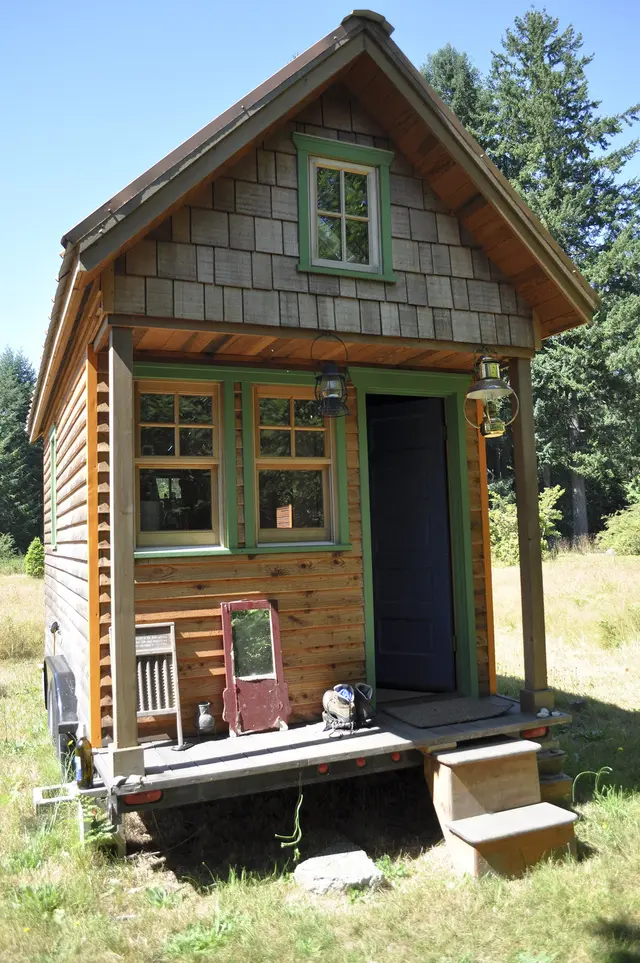
Apr 19, 2023 • Economics
The Economics and Minimalist Lifestyle of Tiny Houses
Bigger isn't always better... or is it?

In a world where "bigger is better" has long been the mantra, a growing number of people are singing a different tune and embracing a new way of living: the tiny house movement. In this blog post, we'll take a light look at the ins and outs of tiny houses, exploring their unique characteristics, the motivations behind choosing this lifestyle, the costs and benefits associated with it, and how they stack up against traditional homes from an economic standpoint.
A Brief Overview of Tiny Houses
Tiny houses are charming, pint-sized abodes that typically range from 100 to 400 square feet, although there's no strict size limit. They often resemble something out of a fairy tale or a minimalist's dream, with clever design features like fold-out furniture, hidden storage, and cozy lofts to make the most of every square inch. Tiny houses can be built on wheels or a fixed foundation, offering flexibility in terms of location and mobility.
Why People Choose Tiny Houses: From the Practical to the Quirky
People are drawn to tiny house living for a variety of reasons, including:
- Affordability: Who wouldn't want to trade a hefty mortgage for a budget-friendly abode? Tiny houses come with lower construction and maintenance costs compared to traditional homes.
- Sustainability: Less space means fewer resources required, making tiny houses an environmentally friendly option for the eco-conscious.
- Minimalism: Bid farewell to clutter and hello to simple, streamlined living!
- Flexibility: For those with wanderlust, a tiny house on wheels lets you take your home with you wherever you go. As they say, "home is where you park it!"
- Community: Joining the ranks of tiny house enthusiasts offers a sense of camaraderie and support, plus endless conversations about clever storage solutions and composting toilets.
Tiny Houses vs. Traditional Homes: An Economic Showdown
To get a clear picture of how tiny houses fare against traditional homes from a financial perspective, let's break down the essential economic factors:
- Initial Costs: Tiny houses boast lower upfront costs, making them an attractive option for first-time buyers or those on a tight budget. For the price of a luxury car, you could own a fully functional living space!
- Land Prices: While tiny houses require less land, finding the perfect parking spot can be a bit like Goldilocks searching for the perfect porridge – not too big, not too small, but just right.
- Financing: Tiny houses may not qualify for a traditional mortgage, so alternative financing methods like personal loans, RV loans, or even crowdfunding can come to the rescue. It's not every day you can say you "Kickstarted" your home!
- Resale Value: Predicting the resale value of tiny houses is like trying to predict the weather – it's uncertain. While tiny houses may appreciate in value over time, finding the right buyer could prove challenging.
- Maintenance and Operating Costs: With less space to heat, cool, and maintain, tiny houses can save you a bundle on utility bills and maintenance expenses. You might even find that one light bulb can illuminate your entire living area!
- Insurance and Property Taxes: Tiny house insurance may be a bit more specialized, but lower property taxes make up for it, keeping more money in your pocket.
So, Are Tiny Houses a Good Investment?
Determining if a tiny house is a wise investment depends on individual financial goals and lifestyle preferences. If you prioritize building equity and maximizing return on investment, a traditional home might be the way to go. However, if minimalism, mobility, and sustainability are your priorities, a tiny house could offer a fulfilling and rewarding experience.
Here are a few factors to consider when deciding whether a tiny house is the right investment for you:
- Long-term financial objectives: If you're looking to build equity and secure a more predictable return on investment, a traditional home may be the safer bet due to the larger and more established market.
- Lifestyle preferences: Embracing tiny house living often means prioritizing experiences over material possessions. If you're ready to declutter your life and focus on what truly matters, a tiny house might be the perfect fit.
- Market fluctuations: The tiny house market can be more volatile due to its niche nature. As charming and unique as your tiny house may be, you'll need to consider that resale value and demand might be influenced by factors like location, design, and broader housing market trends.
A Tiny Verdict for a Tiny House
From an economic perspective, tiny houses offer several benefits, such as lower initial costs, reduced maintenance expenses, and lower property taxes. However, there are potential challenges, including limited financing options and uncertain resale values. Ultimately, the decision to invest in a tiny house should be based on your financial goals, lifestyle preferences, and a thorough understanding of the potential risks and rewards associated with this unique housing option.
So, if you're ready to downsize your life and upsize your adventures, the tiny house movement might just be the perfect way to live large while thinking small. Happy tiny living!




